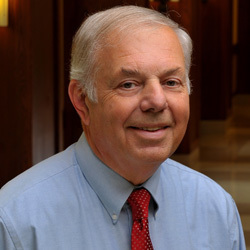
Rudolph M. Navari, M.D., FACP, adjunct professor of chemistry and biochemistry at the University of Notre Dame and associate dean and director of the Indiana University School of Medicine-South Bend (IUSM-SB), has accepted a position with the World Health Organization (WHO) to serve as the director of the Cancer Care Program in Eastern Europe.

He will be based in Geneva, Switzerland and will manage physician education and help introduce up-to-date cancer treatment protocols--both which lag behind what is typical in the United States--and will oversee measurements to determine if both efforts decrease mortality. WHO will work with pharmaceutical companies to help provide treatments at a greatly reduced cost in these countries.
“As a practicing oncologist, I have seen remarkable improvements in the fight against cancer as a result of new drugs and discoveries introduced in recent years. Internationally, though, many die for lack of access to these treatments. I am very privileged and humbled by the opportunity to help reduce suffering for those populations,” Navari said.
Navari came to Notre Dame in 1999 as the director of the Walther Cancer Research Center and was appointed to associate dean for the College of Science in 2000. Joining IUSM-SB as professor of medicine and assistant dean and director in 2005, he continued at Notre Dame as an adjunct professor of chemistry and biochemistry. From 2011 to 2013, Navari served as clinical director of the Harper Cancer Research Institute, a joint partnership between Notre Dame and IUSM-SB.
His research program involves several important issues aimed at improving quality of life of people living with cancer, including cancer-related anorexia (CRA), depressive symptoms in breast cancer patients, and the effect of religious practices and spiritual beliefs on end-of-life care decisions. In 2013, Navari received a $2.1 million grant from NCI for a national study on the effectiveness of olanzapine in eliminating chemotherapy-induced nausea and vomiting. He will continue managing that four-year project from his new position at WHO.